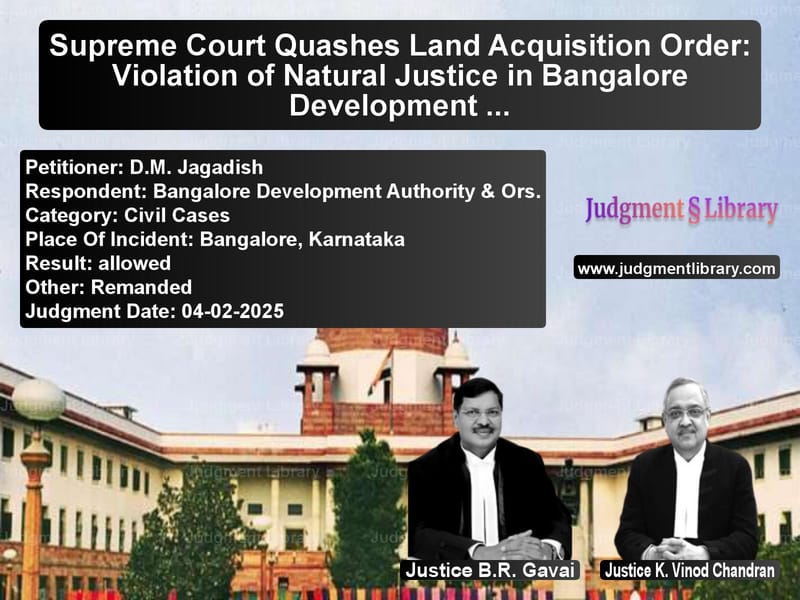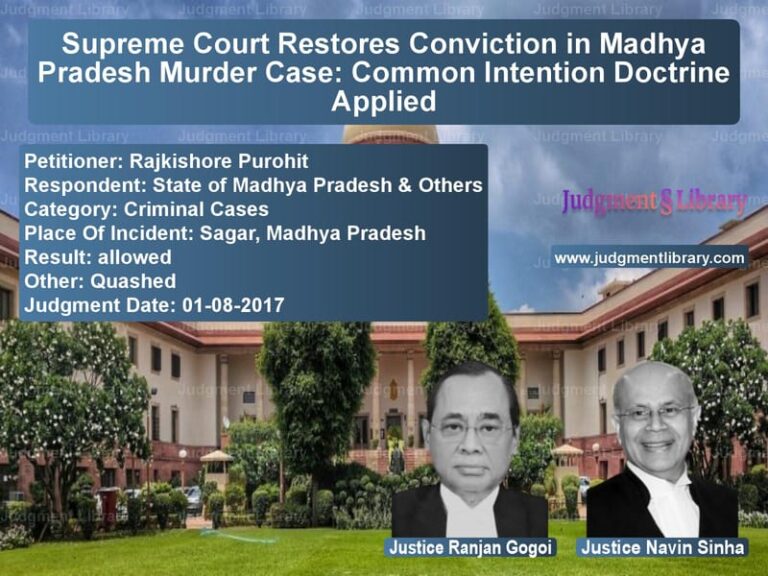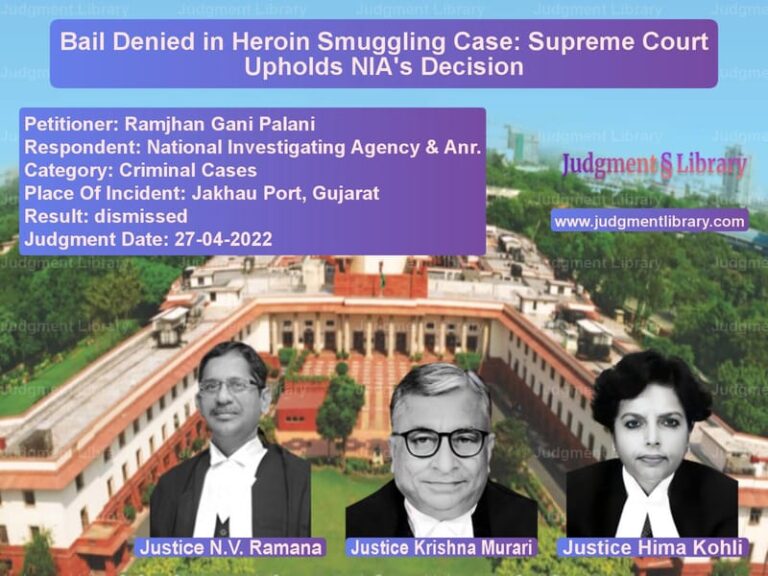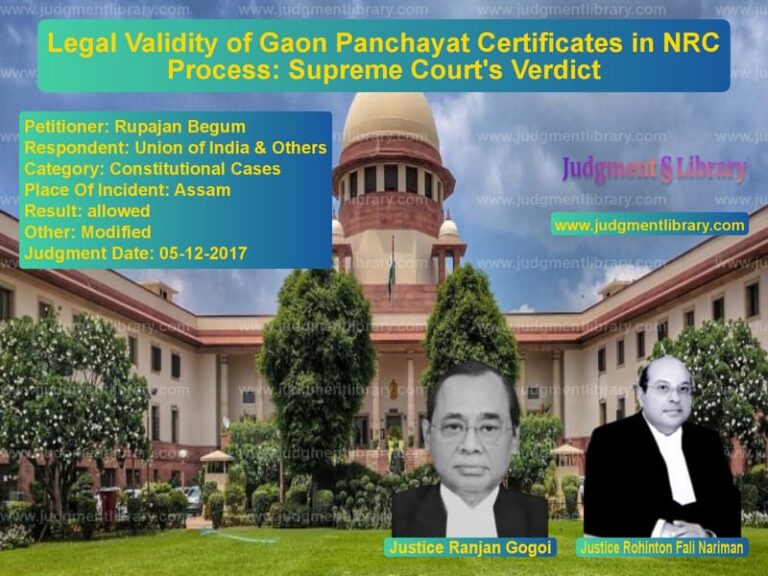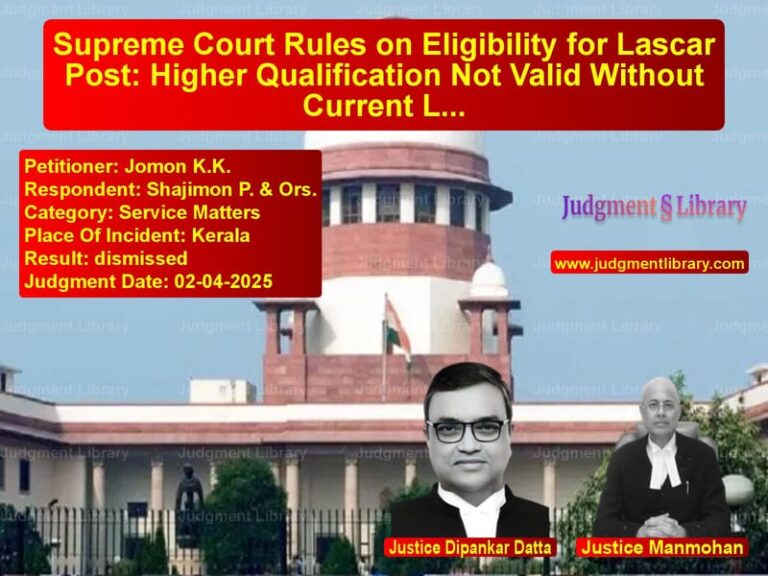Supreme Court Quashes Land Acquisition Order: Violation of Natural Justice in Bangalore Development Case
The Supreme Court in its judgment in D.M. Jagadish vs. Bangalore Development Authority & Ors. ruled on the improper acquisition of land under the Bangalore Development Authority (BDA). The case focused on whether the BDA had followed due process while acquiring land and whether the landowner’s rights had been violated due to procedural lapses.
Background of the Case
The dispute involved the acquisition of land for urban development in Bangalore. The appellant, D.M. Jagadish, challenged the BDA’s decision to acquire his land, arguing that the land adjoining his had been excluded from acquisition and that he was entitled to the same relief. His plea for exemption was rejected multiple times, leading him to approach the courts.
The timeline of events:
- February 3, 2003: A preliminary notification was issued for the acquisition of 380 acres and 4 guntas of land.
- February 23, 2004: A final notification reduced the acquired land to 225 acres and 18 guntas, excluding certain portions.
- June 18, 2014: Another notification excluded 66 acres and 3 guntas from the acquisition.
- 2004: The appellant’s father filed a writ petition challenging the acquisition, which was allowed.
- November 25, 2005: The High Court upheld the acquisition but directed the BDA to consider exclusion requests.
- 2006: The appellant applied for exclusion, citing pre-existing structures, but his request was denied.
- 2015: A fresh writ petition was filed challenging the rejection.
- October 3, 2017: The Single Judge ruled in favor of the appellant, citing non-compliance with the High Court’s 2005 order.
- 2018: The BDA filed an appeal, which was allowed by the Division Bench.
- February 4, 2025: The Supreme Court set aside the Division Bench ruling and remitted the case back for fresh consideration.
Petitioner’s Arguments (D.M. Jagadish)
The petitioner contended:
- The land adjacent to his was excluded from acquisition; hence, his land should also be exempted.
- The BDA failed to follow the High Court’s 2005 directions requiring a case-by-case evaluation.
- His land had pre-existing structures before the 2003 notification, making it ineligible for acquisition.
- The BDA’s rejection of his application was arbitrary and lacked proper reasoning.
The petitioner’s counsel argued:
“The BDA acted in a discriminatory manner by excluding other similarly placed lands while rejecting the petitioner’s claim without justification.”
Respondent’s Arguments (BDA)
The BDA defended its decision, stating:
- The exclusions granted were in line with planning needs and did not set a precedent for other landowners.
- The petitioner’s constructions were allegedly built after the preliminary notification.
- The BDA had followed due process in rejecting exemption applications.
The BDA’s counsel contended:
“Not all landowners are automatically entitled to exclusion, and each case must be examined based on planning necessities.”
Supreme Court’s Observations
The Supreme Court examined the procedural fairness in BDA’s decision-making process. Key observations included:
- The BDA failed to justify why the petitioner’s land was treated differently from adjacent plots that were excluded.
- There was clear evidence that the petitioner had built structures before the 2003 notification.
- The Division Bench of the High Court relied on an affidavit submitted by the BDA without giving the petitioner an opportunity to respond, violating the principle of natural justice.
- The High Court’s earlier directions in 2005 were not followed properly by the BDA.
The Court ruled:
“The approach of the Division Bench in relying on the affidavit of the authority and closing the matter on the same day, without giving an opportunity to the appellant to meet the averments, is in violation of the principles of natural justice.”
Final Judgment
The Supreme Court:
- Set aside the High Court’s Division Bench order.
- Remitted the case back for reconsideration by the High Court.
- Ordered that the status quo on the land be maintained.
The Court concluded:
“The case must be reconsidered by the High Court with proper opportunity for both parties to present their arguments. The petitioner’s claim should be evaluated in light of the principle of fairness and consistency in land acquisition.”
Conclusion
This ruling underscores key legal principles in land acquisition cases:
- Authorities must apply consistent criteria while acquiring land.
- Procedural fairness and natural justice must be upheld in decision-making.
- Landowners must be given an opportunity to contest government affidavits.
- Pre-existing structures must be considered before confirming acquisitions.
The Supreme Court’s decision ensures that land acquisition processes remain transparent, fair, and non-discriminatory.
Petitioner Name: D.M. Jagadish.Respondent Name: Bangalore Development Authority & Ors..Judgment By: Justice B.R. Gavai, Justice K. Vinod Chandran.Place Of Incident: Bangalore, Karnataka.Judgment Date: 04-02-2025.
Don’t miss out on the full details! Download the complete judgment in PDF format below and gain valuable insights instantly!
Download Judgment: d.m.-jagadish-vs-bangalore-developmen-supreme-court-of-india-judgment-dated-04-02-2025.pdf
Directly Download Judgment: Directly download this Judgment
See all petitions in Property Disputes
See all petitions in Landlord-Tenant Disputes
See all petitions in Specific Performance
See all petitions in Damages and Compensation
See all petitions in Judgment by B R Gavai
See all petitions in Judgment by K. Vinod Chandran
See all petitions in allowed
See all petitions in Remanded
See all petitions in supreme court of India judgments February 2025
See all petitions in 2025 judgments
See all posts in Civil Cases Category
See all allowed petitions in Civil Cases Category
See all Dismissed petitions in Civil Cases Category
See all partially allowed petitions in Civil Cases Category

